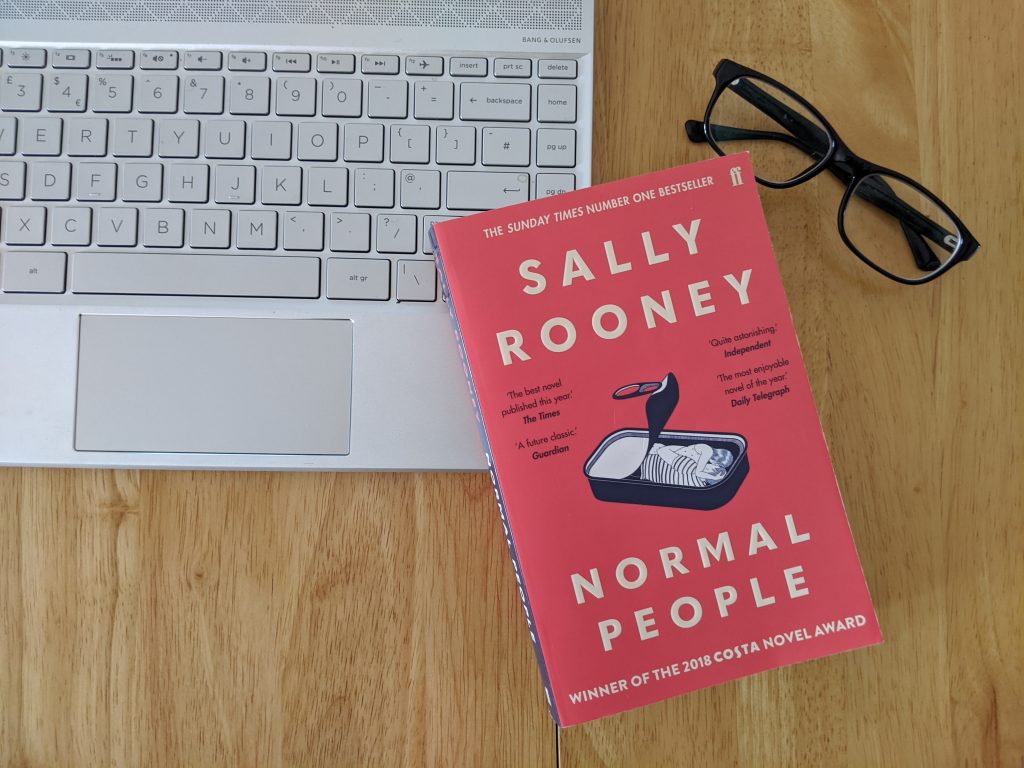Normal People by Sally Rooney

Normal People is set in rural Ireland and follows the on-off-on relationship between Marianne – a socially-awkward misfit who ‘wears ugly thick-soled flat shoes’ and Connell, one of the most popular and good-looking boys in their school. Both are highly intelligent yet come from different social classes. Marianne is wealthy and lives in a mansion while Connell is working-class – his mum works as a cleaner for Marianne’s family, which is where their story begins.
“In school on Monday he had to avoid looking at Marianne or interacting with her in any way. He carried the secret around like something large and hot, like an overfull tray of hot drinks that he had to carry everywhere and never spill. She just acted the same as always, like it never happened, reading her book at the lockers as usual, getting into pointless arguments. At lunchtime on Tuesday, Rob started asking questions about Connell’s mother working in Marianne’s house, and Connell just ate his lunch and tried not to make any facial expressions.”
Normal People is a love story for the modern age. But it is also about the intricacies of friendship and the curiosity and yearning to know more about each other. What starts out as a tender, yet awkward conversation in Marianne’s kitchen, sparks into a secret and intense love affair that keeps you turning the pages. It follows their relationship from high school and into university, giving us an intimate glimpse into the lives of two people who, no matter what life throws their way, can’t seem to stay apart.
“But why Marianne? It wasn’t like she was so attractive. Some people thought she was the ugliest girl in school. What kind of person would want to do this with her? And yet he was there, whatever kind of person he was, doing it.”
What I enjoyed most about Normal People was the way it evoked feelings of nostalgia. Everyone remembers their first love; the intensity, excitement and heartbreak it can bring, and I believe that Sally Rooney captured this perfectly. I also loved the transition of the characters from high school to university, and the way their roles appear to reverse. This is particularly true of Connell, who finds himself struggling to fit in among the middle-class student crowd, whereas Marianne transforms into a social butterfly.
“Come on inside. She goes up the steps to him. Over her shoulder, she says: back in a second. From this remark, and the way she was standing on the steps, he can tell that all these people at the party are her friends, she has a lot of friends and she’s happy.”
Sally Rooney is renowned for her ability to write beautiful dialogue, and in Normal People, the conversations do indeed flow beautifully – albeit without quotation marks, which I did find a little odd. The pacing was slow, and I did feel frustrated at times that the story didn’t seem to be going anywhere; the main protagonists have so much chemistry but refuse to ever admit how they really feel. I think it’s for this reason that I didn’t particularly care for Marianne or Connell, even though I desperately wanted to.
“He put his arm around her waist. He had never, ever touched her in front of anyone else before. Their friends had never seen them together like this, no one had. In the pool, the others were still splashing and yelling.
That’s nice, she said.
He turned his head and kissed her bare shoulder. She laughed again, shocked and gratified. He glanced back at the water and then looked at her.
You’re happy now, he said. You’re smiling.
You’re right, I am happy.
He nodded towards the pool, where Peggy had just fallen into the water, and people were laughing.
Is this what life is like, Connell said.
She looked at his face but couldn’t tell from his expression if he was pleased or miserable. What do you mean? She said, but he only shrugged. A few days later he told her he was leaving Dublin for the summer.”
Overall, I enjoyed Normal People. However, I did feel there were many other strands of Marianne and Connell’s story that could have been further explored. For example, Marianne’s abusive father, her friendships at university, and the roots of Connell’s anxiety. The ending was frustrating, but I appreciate that Rooney has left it up to the reader to decide how Marianne and Connell’s relationship will develop.
If you’re a fan of a ‘will they, won’t’ they romance, that also deals will complex issues such as social class, race and mental health, then you will thoroughly enjoy this book. 4/5


